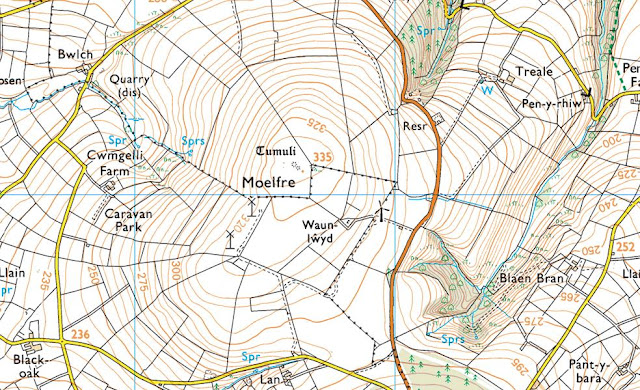Moelfre (SN 326 361)
There has been a Summit Relocation to a hill that is listed in the Y Trichant – The 300m Hills of Wales, with the summit height, bwlch height and their locations, the drop and status of the hill derived from LIDAR analysis conducted by Myrddyn Phillips.
%20-%20LIDAR%20summit%204.jpg) |
| LIDAR image of Moelfre (SN 326 361) |
The criteria for the list that this summit
relocation applies to are:
Y Trichant
– The 300m Hills of Wales – Welsh
hills at or above 300m and below 400m in height that have 30m minimum drop, with an accompanying sub list entitled the
Sub-Trichant, with the criteria for this sub category being all Welsh hills at
or above 300m and below 400m in height with 20m or more and below 30m of
drop. The list is authored by Myrddyn Phillips with the
Introduction to the list and the renaming of it appearing on Mapping Mountains
on the 13th May 2017, and the Introduction to the Mapping Mountains
publication of the list appearing on the 1st January 2022.
 |
| Y Trichant - The 300m Hills of Wales by Myrddyn Phillips |
The name the hill is listed by is Moelfre, and it
is adjoined to the Mynydd Pencarreg group of hills, which are situated in the south-western part of
South Wales (Region B, Sub-Region B1), and
it is positioned with minor roads to its north-west, west and south, and the
B4333 road to its east, and has the town of Castell Newydd Emlyn (Newcastle
Emlyn) towards the north north-west.
When the original 300m height band of Welsh P30 hills were published on Geoff Crowder’s v-g.me website, this hill was included
in the main P30 list with a summit height of 335m, based on the spot height
that appears on the contemporary Ordnance Survey 1:50,000 Landranger and
1:25,000 Explorer map.
After the sub list was standardised, and interpolated
heights and drop values also included the details for this hill were
re-evaluated and it was listed with 104m of drop, based on the 335m summit spot
height positioned at SN 32648 36095 and the 231m bwlch spot height that
appeared on the Ordnance Survey Vector Map Local hosted on the Geograph website
and which was entitled the Interactive Coverage Map.
%20-%201%2025000.jpg) |
| Extract from the Ordnance Survey 1:25,000 Explorer map |
However, it was not until LIDAR became available
that the details for this hill could be accurately re-assessed. The LIDAR (Light Detection & Ranging)
technique produced highly accurate height data that is now freely available for
much of England and Wales.
LIDAR analysis gives the highest ground on this
hill as 335.4m positioned at SN 32685 36114.
However, although this is positioned atop an ancient tumulus which under
the protocols used for this list qualifies for the height of a hill, LIDAR
contouring implies the height has been artificially raised by a field boundary positioned
on the tumulus and protocols dictate that as this is deemed a relatively recent
man-made construct such ground is discounted from the height of a hill.
%20-%20LIDAR%20summit%201.jpg) |
| LIDAR summit image of Moelfre (SN 326 361) |
The height produced by LIDAR analysis to the qualifying
summit of this hill is 335.3m positioned at SN 32616 36119 and SN 32619 36117,
and this position in relation to the raised field boundary comes within the parameters of
the Summit Relocations used within this page heading, these parameters are:
The term Summit Relocations applies when the high
point of the hill is found to be positioned; in a different field, to a
different feature such as in a conifer plantation, within a different map contour, to a
different point where a number of potential summit positions are within close
proximity, when natural ground or the natural and intact summit of a hill is
confirmed compared to a higher point such as a raised field boundary or covered
reservoir that is considered a relatively recent man-made construct, or a
relocation of approximately 100 metres or more in distance from either the
position of a map spot height or from where the summit of the hill was
previously thought to exist.
Therefore, the summit height produced by LIDAR
analysis is 335.3m and this is positioned at SN 32616 36119 and SN 32619 36117,
this position is not given a spot height on the contemporary Ordnance Survey
1:50,000 Landranger and 1:25,000 Explorer map and is approximately 33 metres north-westward
from where the 335m spot height appears and approximately 70 metres westward
from the high point of the raised field boundary.
The full details for the hill are:
Group: Mynydd Pencarreg
Name: Moelfre
OS 1:50,000 map: 145
Summit Height: 335.3m (LIDAR)
Summit Grid Reference (New Position): SN 32616 36119 & SN 32619 36117 (LIDAR)
Bwlch Height: 231.0m (LIDAR)
Bwlch Grid Reference: SN 41888 33712 (LIDAR)
Drop: 104.4m (LIDAR)
Myrddyn Phillips (May
2024)

No comments:
Post a Comment